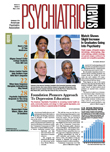Recent studies have identified more genetic variations to explain why antidepressants work in some patients but not others and suggest molecular targets for new antidepressants.
In a study published online in Neuropsychopharmacology in February, researchers at Massachusetts General Hospital and the University of Texas Southwestern Medical Center linked a genetic variation to patients' response to antidepressants based on DNA data from 1,554 participants in the Sequenced Treatment Alternatives to Relieve Depression (STAR*D) study.
Unlike previous genetic studies in depression that focused on neurotransmitters and receptors in the serotonin and norepinephrine systems, the gene KCNK2 identified in this study codes for a potassium channel widely existing in the brain.
STAR*D was a large clinical trial funded by the National Institute of Mental Health in which adults with major depression went through a stepwise treatment algorithm: those who did not reach remission on citalopram after up to 14 weeks were treated with two additional steps with options that included switching to another antidepressant, switching to cognitive therapy, and continuing with citalopram augmented with bupropion, buspirone, or cognitive therapy.
The association between KCNK2 mutations and patients' response to treatment was not significant in the first treatment level involving citalopram, but was statistically significant in both the second and third steps of treatment, in which 751 patients participated.
“We didn't find a significant difference between responders and nonresponders in the first step, most likely because many people who responded to citalopram in the first treatment step had a placebo effect or would have improved without treatment,” Roy Perlis, M.D., an assistant professor of psychiatry at Harvard Medical School and director of the Pharmocogenetics Research Division of the Department of Psychiatry at Massachusetts General Hospital, told Psychiatric News. He was also the lead author of the study. STAR*D did not include a placebo arm out of ethical considerations. After removing the less severely depressed patients, the effect of genetic variation on different responses to active treatment became more apparent in the second and third steps, Perlis explained.
Study data also showed that this gene was generally associated with treatment response to all antidepressants regardless of whether patients continued on citalopram or switched to another medication. In contrast, no significant connection between the genetic variations and response to cognitive therapy was observed. “The reason may be different pathways for psychotherapy and antidepressants or the small sample size [n=71] in the psychotherapy response,” said Perlis.
Transporter Gene Has Effect
According to another study published in Neuron in January, polymorphisms of the gene ABCB1 may be a predictor of different response to antidepressants. The ABCB1 gene codes for one of the transporter proteins embedded in cell membranes. These transporters bind to and pump molecules out of the blood-brain barrier, which in turn regulate how much a drug can gain access to the brain.
Manfred Uhr, M.D., and colleagues at the Max Planck Institute of Psychiatry in Germany first tested the gene in mice with genes corresponding to human ABCB1 knocked out and saw higher concentrations of citalopram, venlafaxine, and d-venlafaxine in the brain. Some antidepressants, such as mirtazapine, are not affected by this transporter because they do not bind to the protein.
The researchers then conducted a clinical study in 443 patients with depression and found that polymorphisms of the ABCB1 gene were significantly associated with the efficacy of the antidepressants that are bound to this transporter. The likelihood of reaching remission after four weeks of antidepressant treatment was significantly different depending on what polymorphism was carried by the patient.
Drug Responses Point to Genetics
The two studies join a growing body of evidence that suggests that different responses to antidepressant drugs may be intimately influenced by genetic variations among patients. More and more genes are found to influence the pathology of depression and the efficacy and safety of treatments in many complicated mechanisms.
Perlis cautioned that the genetic studies in depression by his group and others must be considered preliminary until the results are replicated.“ We are at the early stage of [genetic] research about depression,” he said. “A lot of work has to be done to convince people that these factors are both real and clinically relevant. It is crucial that clinicians understand this point and not rush to give patients unrealistic impressions in the clinic.”
The genes identified in these studies also add to scientists' understanding of the disease process of depression and how drugs act in the body. Researchers are also piecing together the puzzle of why antidepressants work in a large number of patients but seem ineffective or intolerable in others. The genetic variations and protein functions provide many targets for the development of new drugs that can benefit treatment-resistant patients.
“The STAR*D study that enabled us to do this [genetic research] was incredibly important... .It was very ambitious,” Perlis added. “We desperately need even larger studies to replicate these findings. The question is who will support such studies?” To find reliable and accurate genetic associations, thousands of patients are required to provide abundant data for analyses. To translate discoveries in the laboratory to better medicine and better care for patients in the clinic requires more studies like STAR*D. “It is possible, but it won't happen tomorrow,” Perlis said.
An abstract of “Pharmacogenetic Analysis of Genes Implicated in Rodent Models of Antidepressant Response: Association of TREK1 and Treatment Resistance in the STAR*D Study” is posted at<www.nature.com/npp/journal/vaop/ncurrent/abs/npp20086a.html>. An abstract of “Polymorphisms in the Drug Transporter Gene ABCB1 Predict Antidepressant Treatment Response in Depression” is posted at<www.neuron.org/content/article/abstract?uid=PIIS0896627307009750>.▪
